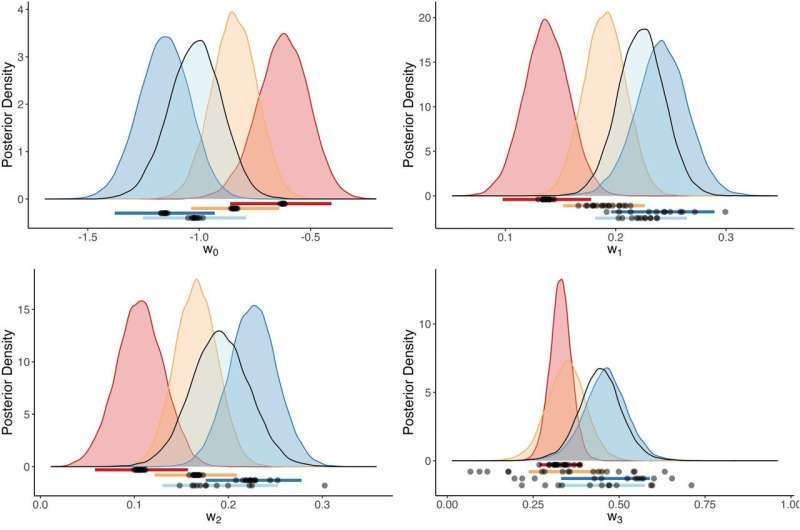This article has been reviewed according to Science X's editorial process and policies. Editors have highlighted the following attributes while ensuring the content's credibility:
fact-checked
trusted source
proofread
Study shows differences in how patients with impulse control disorder process consequences

Parkinson's disease is a neurological disorder that affects movement and muscle control. One characteristic of the disease is the deficiency of dopamine, a neurotransmitter or brain chemical that plays a role in movement and can impact how people think and feel.
Dopaminergic medicines can help alleviate the symptoms of Parkinson's disease. However, in some patients, the medications can cause impulse control disorder (ICD), characterized by risky behavior such as excessive gambling, shopping, sexual activity or eating.
In a new study, published online in Scientific Reports, researchers found differences in how people with ICD process the consequences of their actions compared to those without ICD, both on and off medication.
"Our goal was to investigate how factors that influence the decision-making process may also affect how people feel in patients with and without ICD," said Kenneth Kishida, Ph.D., corresponding author of the study and an associate professor of translational neuroscience and neurosurgery at Wake Forest University School of Medicine.
For the study, researchers recruited 30 people with Parkinson's disease—18 individuals also had ICD and 12 individuals did not have ICD. All study participants performed a simple computer task in two different states—while on their dopaminergic medications and while off their dopaminergic medications.
The task presented repeated trials of risky choices (gambles) that consisted of a "sure bet" or a "gamble." The "sure bet" was a guaranteed small amount of money, whereas the "gamble" was a 50-50 outcome of two different amounts of money. After the study participants made their choice, they were shown the outcome of their decision.
The participants were occasionally asked to rate how they felt about their outcome. The research team then used computational models to analyze the data.
"We found that participants with ICD showed a significant difference in the factors that drive their feelings about the risky decisions that they made," Kishida said. "Compared to the non-ICD group, patients with ICD were not as affected by the consequences of their actions (good or bad). This was true regardless of their medication state."
When patients with ICD were on their medications, the researchers found that their expectations drove their feelings significantly more than when they were off of their medications. This difference was not observed for patients without ICD.
"These results suggest that patients with ICD may get positive feelings from taking risky actions based on their expectations of good outcomes. But, when those risky choices do not pan out, they do not process the negative feedback in a typical way," Kishida said.
"It may mean that these patients, when in a medicated state, may enjoy risky choices for the sake of risky choices, and they do not modulate their feelings in an appropriately negative way when the results are poor."
Kishida said the findings might have implications for understanding the impact of dopaminergic drugs on behavior more generally and may provide clues about how addictive substances (such as nicotine, cocaine, or alcohol) may influence subjective feelings about risky behaviors or decision-making more generally.
"This study provides insight into the psychological and behavioral aspects of Parkinson's disease, especially in the context of medication-induced side effects," Kishida said. "It also contributes to a broader understanding of how dopaminergic drugs and addictive substances influence decision-making processes and subjective feelings related to risky behaviors."
More information: Subjective feelings associated with expectations and rewards during risky decision‐making in impulse control disorder, Scientific Reports (2024). DOI: 10.1038/s41598-024-53076-2



















